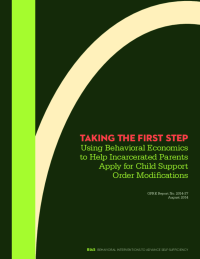Taking the First Step
Using Behavioral Economics to Help Incarcerated Parents Apply for Child Support Order Modifications
The Behavioral Interventions to Advance Self-Sufficiency (BIAS) project, sponsored by the Office of Planning, Research and Evaluation of the Administration for Children and Families (ACF) in the U.S. Department of Health and Human Services, is the first major opportunity to apply a behavioral economics lens to programs that serve poor and vulnerable families in the United States. Led by MDRC, the project applies behavioral insights to issues related to the operations, implementation, structure, and efficacy of selected social service programs and policies, with the goal of learning how tools from behavioral science can be used to deliver programs more effectively and, ultimately, to improve the well-being of low-income children, adults, and families.
This report presents findings from a behavioral intervention designed to increase the number of incarcerated noncustodial parents in Texas who apply for modifications to reduce the amount of their child support orders. Incarcerated noncustodial parents have a limited ability to pay their child support orders each month, due to their incarceration, which can lead to the accumulation of significant child support debt. The Texas Office of the Attorney General’s (OAG’s) Child Support Division operates a program that contacts incarcerated noncustodial parents via mail, informs them of the option to apply for order modifications, and provides instructions on how to begin the process. In the past, less than one-third of contacted parents responded to the outreach and applied for a modification — less than expected, given the benefits they gain from modifying their orders.
The BIAS project diagnosed bottlenecks in the application process, hypothesized behavioral reasons for the bottlenecks, and designed behaviorally informed changes to the mailing sent to incarcerated noncustodial parents. It revised the letter to make it more readable, printed it on blue paper so that it would stand out, pre-populated a section of the application, and sent a postcard before the letter was sent and another postcard following the letter to those who had not responded. While this was a low-cost effort (less than $2 per person), the revised outreach increased the application response rate to 39 percent, an 11 percentage point increase over the control group’s response rate of roughly 28 percent. Program administrators hope that this is an important first step in a causal chain hypothesized to reduce child support arrears owed, leading, in turn, to an increase in the likelihood that, on release, parents will support their children.
The intervention produced a highly statistically significant impact at relatively low cost and demonstrated the promise of applying behavioral economics principles to improve program implementation and outcomes.






